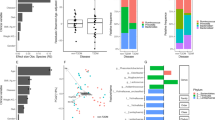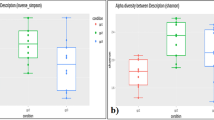Abstract
Anorexia nervosa (AN) is a severe eating disorder which can lead to malnutrition and life threatening complications with high mortality rates. We designed our analysis to identify gut microbial taxa differentially abundant between AN and HC across different 16S rRNA gene datasets. We identified a reduced abundance, diversity and richness of Roseburia genus in the microbiota of patients with AN. Cares leading to partial recovery of patients with AN during hospitalization did not restore Roseburia to the levels of HC. AN dietary habit, either purgative or restrictive, did not affect Roseburia abundance. Roseburia genus and related species abundance were correlated with different health host metabolic markers. Roseburia species are key functional taxa in the human gut microbiome. Low gut Roseburia levels have been linked with other human pathologies. Our study highlights Roseburia species as a major decreased component in the gut of patients with AN.
This is a preview of subscription content, access via your institution
Access options
Subscribe to this journal
Receive 12 print issues and online access
$259.00 per year
only $21.58 per issue
Buy this article
- Purchase on Springer Link
- Instant access to full article PDF
Prices may be subject to local taxes which are calculated during checkout

Similar content being viewed by others
Data availability
Datasets for this research are available under NCBI project number PRJEB11199 and PRJNA375065 for Mack et al. and Borgo et al. respectively. Datasets Hanachi et al are available under request to MH.
References
American Psychiatric Association. Diagnostic and statistical manual of mental disorders. American Psychiatric Association; 2013. https://doi.org/10.1176/appi.books.9780890425596.
Roux H, Chapelon E, Godart N. Épidémiologie de l’anorexie mentale: revue de la littérature. Encephale . 2013;39:85–93. https://doi.org/10.1016/j.encep.2012.06.001.
Ghenciulescu A, Park RJ, Burnet PWJ. The gut microbiome in anorexia nervosa: friend or foe? Front Psychiatry. 2020;11:611677 https://doi.org/10.3389/fpsyt.2020.611677.
Di Lodovico L, Mondot S, Doré J, Mack I, Hanachi M, Gorwood P. Anorexia nervosa and gut microbiota: a systematic review and quantitative synthesis of pooled microbiological data. Prog Neuropsychopharmacol Biol Psychiatry. 2020;110114. https://doi.org/10.1016/j.pnpbp.2020.110114.
Borgo F, Riva A, Benetti A, Casiraghi MC, Bertelli S, Garbossa S, et al. Microbiota in anorexia nervosa: The triangle between bacterial species, metabolites and psychological tests. PLoS One. 2017;12:1–17. https://doi.org/10.1371/journal.pone.0179739.
Hanachi M, Manichanh C, Schoenenberger A, Pascal V, Levenez F, Cournède N, et al. Altered host-gut microbes symbiosis in severely malnourished anorexia nervosa (AN) patients undergoing enteral nutrition: An explicative factor of functional intestinal disorders? Clin Nutr. 2019;38:2304–10. https://doi.org/10.1016/j.clnu.2018.10.004.
Mack I, Cuntz U, Grmer C, Niedermaier S, Pohl C, Schwiertz A, et al. Weight gain in anorexia nervosa does not ameliorate the faecal microbiota, branched chain fatty acid profiles, and gastrointestinal complaints. Sci Rep. 2016;6:1–16. https://doi.org/10.1038/srep26752.
Mörkl S, Lackner S, Müller W, Gorkiewicz G, Kashofer K, Oberascher A, et al. Gut microbiota and body composition in anorexia nervosa inpatients in comparison to athletes, overweight, obese, and normal weight controls. Int J Eat Disord. 2017;50:1421–31. https://doi.org/10.1002/eat.22801.
Martin-Gallausiaux C, Marinelli L, Blottière HM, Larraufie P, Lapaque N. Conference on diet and digestive disease symposium 2: sensing and signalling of the gut environment: Scfa: mechanisms and functional importance in the gut. Proc Nutr Soc. 2021;80:37–49. https://doi.org/10.1017/S0029665120006916.
Ye X, Wang D, Zhu H, Wang D, Li J, Tang Y, et al. Gut microbiota changes in patients with major depressive disorder treated with vortioxetine. Front psychiatry. 2021;12:641491 https://doi.org/10.3389/fpsyt.2021.641491.
Sobko T, Liang S, Cheng WHG, Tun HM. Impact of outdoor nature-related activities on gut microbiota, fecal serotonin, and perceived stress in preschool children: the Play&Grow randomized controlled trial. Sci Rep. 2020;10:21993 https://doi.org/10.1038/s41598-020-78642-2.
Zheng LJ, Lin L, Zhong J, Zhang Z, Ye YB, Zhang XY, et al. Gut dysbiosis-influence on amygdala-based functional activity in patients with end stage renal disease: a preliminary study. Brain Imaging Behav. 2020;14:2731–44. https://doi.org/10.1007/s11682-019-00223-3.
Rondanelli M, Gasparri C, Peroni G, Faliva MA, Naso M, Perna S, et al. The potential roles of very low calorie, very low calorie ketogenic diets and very low carbohydrate diets on the gut microbiota composition. Front Endocrinol. 2021;12:662591 https://doi.org/10.3389/fendo.2021.662591.
Hata T, Miyata N, Takakura S, Yoshihara K, Asano Y, Kimura-Todani T, et al. The gut microbiome derived from anorexia nervosa patients impairs weight gain and behavioral performance in female mice. Endocrinology. 2019;160:2441–52. https://doi.org/10.1210/en.2019-00408.
Acknowledgements
We are grateful to the INRAE MIGALE bioinformatics facility (MIGALE, INRAE, 2020. Migale Bioinformatics Facility, https://doi.org/10.15454/1.5572390655343293E12) for providing help, computing and storage resources.
Funding
This project was funded by the European Commission under ERC-2017-AdG n. 788191 - Homo.symbiosus and by the French Foundation under project number 00101804.
Author information
Authors and Affiliations
Contributions
SM conceived the study design, collected the data, performed the statistical analysis and wrote the manuscript. All authors edited, reviewed and approved the final manuscript.
Corresponding authors
Ethics declarations
Competing interests
The authors declare no competing interests.
Additional information
Publisher’s note Springer Nature remains neutral with regard to jurisdictional claims in published maps and institutional affiliations.
Supplementary information
Rights and permissions
About this article
Cite this article
Mondot, S., Lachkar, L., Doré, J. et al. Roseburia, a decreased bacterial taxon in the gut microbiota of patients suffering from anorexia nervosa. Eur J Clin Nutr 76, 1486–1489 (2022). https://doi.org/10.1038/s41430-022-01116-3
Received:
Revised:
Accepted:
Published:
Issue Date:
DOI: https://doi.org/10.1038/s41430-022-01116-3



